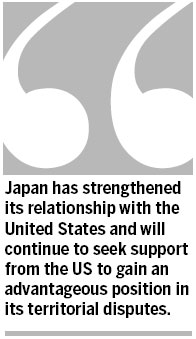Actions don't match words
Updated: 2013-01-08 07:56
By Su Xiaohui (China Daily)
|
|||||||||||

Japan lacks sincerity in improving relations with China and its growing militarism is causing concern in the region
The so-called purchase of the Diaoyu Islands by the Yoshihiko Noda government had a serious impact on the mutual trust between China and Japan. But after Japan's Liberal Democratic Party won a landslide victory in the House of Representatives election and Shinzo Abe became prime minister for the second time, China asked the new government to show sincerity and solve the dispute with China through negotiation.
Japan has made some positive responses, with Abe stating that the relationship between Japan and China is one of the most important bilateral ties for Japan, and China is an indispensable partner for Japan's economic growth. The new Japanese Ambassador to China Masato Kitera also said that the deadlock in bilateral relations would not help Japan's economy and the people of the two countries, and he said improving the bilateral relationship will be his top priority.
Unfortunately, up to now, Japan has failed to break the deadlock. What is worse, the country's domestic and foreign policies will probably have more negative influences on the bilateral relationship.
China is concerned about Japan turning more conservative. Japan has never properly dealt with its history of militarist aggression. On the contrary, the country has been trying to escape the post-World War II arrangements. It is widely believed that the new government led by the LDP will take action to invalidate the pacifist constitution, which is obviously an important part of the postwar arrangements.
Currently, the forces that support amending the constitution outweigh those who defend the constitution, and the calls for constitutional amendments from various political parties have got louder. The LDP compiled new proposals in April 2012 that included renaming the Self-Defense Forces the national defense forces. For Abe, changing the constitution is an unfinished task. In 2007, when he served as prime minister for the first time, the national referendum law was enacted. The law established the procedures for amending the constitution. Recently, Abe reaffirmed that revising Japan's pacifist constitution is his long-cherished goal.
Related Stories
Japan's defense budget plan concerns neighbors 2013-01-08 02:35
Overcome difficulties in ties, China urges Japan 2012-12-28 17:44
World expects new starting point on China-Japan ties 2012-12-27 10:06
Abe elected as Japan's premier, launches Cabinet 2012-12-27 09:37
Today's Top News
Police continue manhunt for 2nd bombing suspect
H7N9 flu transmission studied
8% growth predicted for Q2
Nuke reactor gets foreign contract
First couple on Time's list of most influential
'Green' awareness levels drop in Beijing
Palace Museum spruces up
Trading channels 'need to broaden'
Hot Topics
Lunar probe , China growth forecasts, Emission rules get tougher, China seen through 'colored lens', International board,
Editor's Picks

|

|

|

|

|

|





